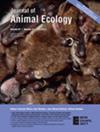Hierarchies inferred from different agonistic behaviours are not always comparable
IF 3.5
1区 环境科学与生态学
Q1 ECOLOGY
引用次数: 0
Abstract

从不同的激动行为中推断出的等级并不总是可比的。
社会等级被广泛用于预测生活史模式和获取资源的优先权。然而,行为生态学和社会科学在不同的研究中缺乏特定行为与社会等级之间的一致关系。我使用了代表多个类群的 25 个物种的 42 个群体的已发表数据集,以确定从不同行为推断出的等级在个体和群体水平上是否相似或(不)一致。在没有攻击行为("仪式化的")的情况下,从屈服互动中推断出的等级往往与从已决定的攻击行为(结果不明确)中推断出的等级相当,但与从未决攻击行为中推断出的等级却不相当。因此,从仅包括已决定的互动的数据集中推断出的等级比从包括未决定的攻击的数据集中推断出的等级更陡峭。这些结果支持了这样一个假设,即攻击行为可能与环境有关,而且与(仪式化的)屈服互动相比,攻击行为可能反映了不太稳定或相互认可的关系。我讨论了选择不同行为来推断社会等级的后果,以及从一个物种或分类群概括到另一个物种或分类群的困难。最后,我建议应优先使用仪式化屈服,当然也应优先使用已决定而非未决定的互动来推断社会等级,尤其是在超越分类群特异性的比较研究中。
本文章由计算机程序翻译,如有差异,请以英文原文为准。
求助全文
约1分钟内获得全文
求助全文
来源期刊

Journal of Animal Ecology
环境科学-动物学
CiteScore
9.10
自引率
4.20%
发文量
188
审稿时长
3 months
期刊介绍:
Journal of Animal Ecology publishes the best original research on all aspects of animal ecology, ranging from the molecular to the ecosystem level. These may be field, laboratory and theoretical studies utilising terrestrial, freshwater or marine systems.
 求助内容:
求助内容: 应助结果提醒方式:
应助结果提醒方式:


